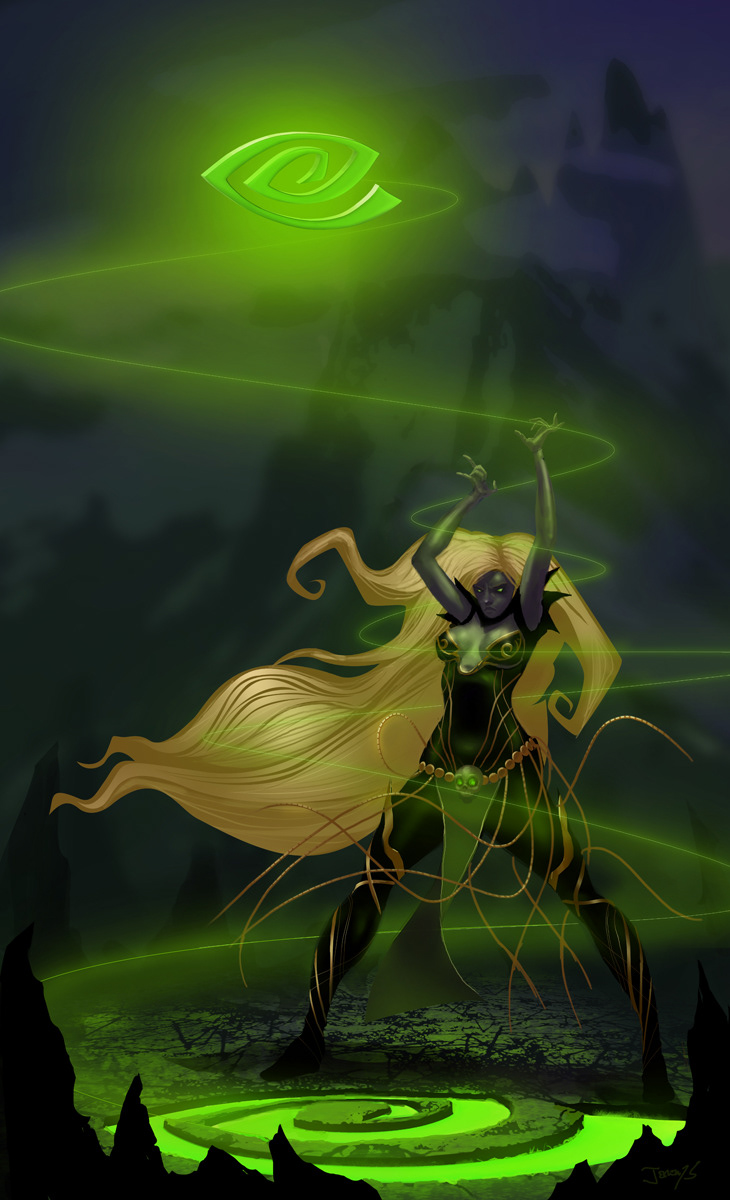



I was invited to do live demonstrations for Nvidia a few weeks ago, and they asked if I would also write about my experience. The following is a summary of my time and my one on one experience with their new virtual desktop.
I recently had the opportunity to use NVIDIA GRID technology while doing live demonstrations at
VMworld 2014 in San Francisco. For four days, I manned a pod showing off Adobe Photoshop CC running
in a virtualized environment using a thin client connected to a server equipped with an NVIDIA GRID K2
card running a VMware vGPU instance through vSphere. The idea was to do “real work” during the show
by designing a different NVIDIA-themed character for each of the four days while pushing the limits of
image size and resolution. I would create each character in real time while taking ideas and feedback
from booth visitors—a far more powerful demonstration of what NVIDIA GRID can do than any canned
or scripted demo could achieve. I did almost all of my work in Photoshop; however, I did occasionally
open up Illustrator to demonstrate working with large vector files in a virtual environment.
Grid Man was my first character, a heroic mad scientist sort whose experiments with virtual graphics
processing had escaped the lab. Aside from a few issues getting my Wacom Intuos tablet to work (such
as pressure-sensitivity), I was up and drawing in almost no time. The .PSD file grew to somewhere
around 400MB as I worked, but the NVIDIA GRID K2 worked flawlessly. Evan large, GPU-heavy
procedures, such as flipping the entire image horizontally, were almost instantaneous—much faster
even than my home workstation. Visitors loved the live demo, and suggestions came pouring in. For
example, someone suggested replacing Grid Man’s goggles with Google Glass lenses to make him more
cutting edge.
Day two saw me creating a sorceress conjuring up an NVIDIA logo. I did my best to push NVIDIA GRID to
its limits by selecting an image size of 12”x7” at 600dpi resolution with well over 30 layers. The K2 card
shrugged it off and kept delivering extremely rapid performance, letting me design a very striking female
character, complete with NVIDIA GRID logos and colors. Needless to say, this design was by far the most
popular one I did during those four days!
Day three threw me a curveball: NVIDIA, along with VMware and Google, announced that GRID would
work on a Chromebook powered by the NVIDIA Tegra processor, and turned to me for proof. I was
unable to use my trusty Wacom tablet and stylus, and had to rely on a mouse and keyboard, but that
was the only major change. NVIDIA GRID delivered the exact same performance I had enjoyed on the
thin client over the prior two days, and the flying armored superhero was the result. The audience
couldn’t believe I was doing this on a Chromebook and asked lots of great artistic and technical
questions.
My understanding is that each GRID GPU can support up to eight simultaneous users, so I decided to
create a kraken-like eight-legged octopus for the final day of the conference. I was back on my thin
client with my tablet, and once again NVIDIA GRID delivered top-notch performance.
All in all, it was a great conference, and I truly enjoyed the chance to see firsthand what NVIDIA GRID
technology can do. I got to spend four days doing what I love while soaking up the positive energy of the
people coming by who were amazed to see someone drawing live... and even more amazed when they
learned it was all happening in a virtual environment.
On a personal level, the ability to centralize my assets and application and then access my environment
form almost anywhere on almost any device with the full performance I need to work effectively is
liberating, because it frees artists from their studios to work whenever—and wherever—inspiration
strikes.




